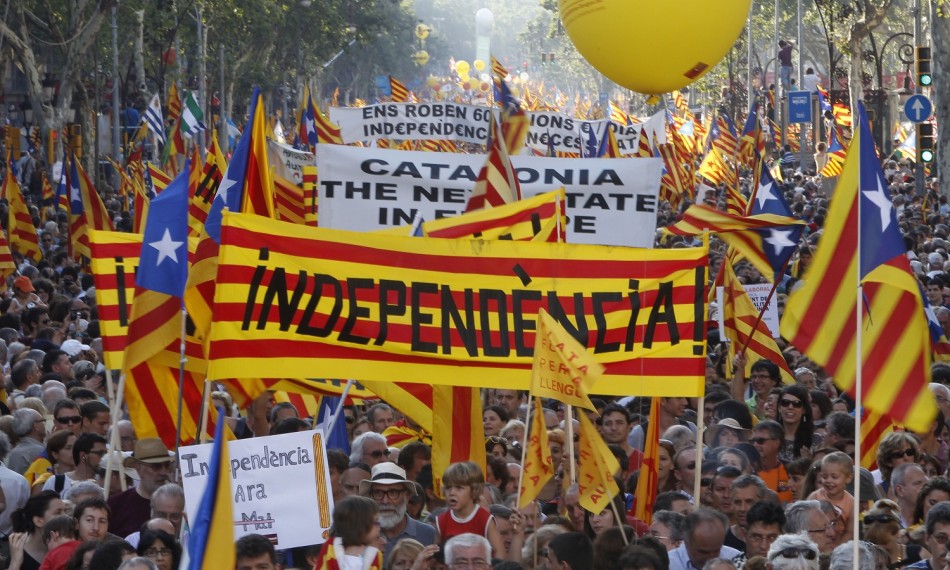
On 1 October, Catalan nationalists plan to hold an illegal referendum on leaving Spain, and declare independence for Catalonia if they win.
Spain's richest region, with its proud capital city Barcelona, could theoretically be turning its back and snapping its wallet shut, plunging the eurozone's fourth-biggest economy back into crisis. But will it happen? Will there even be a vote?
How did we get to a referendum?
Catalan nationalism. After separatists won the region's last legal election in 2015, they set about organising the ballot, based on the unofficial poll of November 2014, when 80% of those who voted are believed to have backed independence.
Criminal charges are being drawn up against members of the Catalan parliament for voting for the referendum, and against members of the Catalan government for signing off on it.
All local councils in Catalonia, Mr Rajoy said, would be warned of their "obligation to impede or paralyse" any effort to hold the vote. "What is not legal is not democratic," he insisted.
Unbowed, mayors across Catalonia posted photos of themselves signing declarations in support of the referendum.
In contrast to the 2014 poll, Spain's national police force, the Guardia Civil, has been deployed to enforce the suspension of the referendum. They searched a printer's shop and a newspaper office for election materials.
Spanish prosecutors have ordered both the Guardia Civil and the Mossos d'Esquadra - the local police force controlled by the Catalan government - to confiscate ballot boxes, flyers or any other items that could be used in the referendum. How the Mossos respond to orders from Madrid will be one of the big tests of the crisis.
The Catalan government has suggested voters on 1 October print their own ballot papers and, according to Reuters news agency, Mr Puigdemont says he has ballot boxes and voting papers hidden away.
Just 2.2 million voters out of a potential 5.4 million turned out for the 2014 ballot which, like the upcoming referendum, was branded illegal by Madrid.
The 2015 election was won by a coalition of separatist parties, Junts pel Si (Together for Yes), with the support of a radical left-wing party, the CUP. But between them, the parties won only 48% of the vote.
More worryingly for the secessionists, a public survey in June suggested 49% of Catalans opposed independence, compared to 41% in favour.
Turnout at the annual Catalan national day event in Barcelona on 11 September was impressive - around a million people according to local police - but in 2014 it was estimated at 1.8 million.
The urgency of President Puigdemont's referendum drive may in part be explained by the realisation that support has been ebbing for some time now.
How far will the separatists go?
Relentless positivity, good humour and wit have characterised the Si independence campaign.
Faced with a largely hostile Spanish press, activists expertly use social media to organise and inspire supporters. Seminars have been organised in foreign cities to promote Catalan nationhood.
Non-separatists in Catalonia can feel nervous about expressing unionist views or criticising the referendum, but the independence movement remains peaceful so far. There has been none of the separatist violence which plagued the Spanish Basque Country until recent years.
But nobody knows what might happen if Madrid does suppress the vote and offers nothing in its place.
"What can they expect from Catalonia but animosity, hate?" wrote one Catalan blogger. "No solution in sight."
Region or nation?
With its own language, a recorded history of more than 1,000 years as a distinct region, and a population nearly as big as Switzerland's (7.5 million), Catalonia's claim to nationhood is serious, even though questioned.
The urgency of President Puigdemont's referendum drive may in part be explained by the realisation that support has been ebbing for some time now.
Spain's rapid return to democracy brought devolution to Catalonia, along with some of Spain's other regions.
Prosperity followed, with Barcelona becoming one of the EU's best-loved cities, famed for its 1992 Summer Olympics, trade fairs, football and tourism.
But Spain's 2008 economic crisis hit Catalonia hard, leaving it with 19% unemployment (compared with 21% nationally).
The region, which makes up 16% of Spain's population, accounts for almost 19% of Spanish GDP yet there is a widespread feeling that the central government takes much more than it gives back.
This sense of injustice has fuelled the independence campaign, especially the demand for greater fiscal powers.
On the other hand, Spain's economic recovery under Mr Rajoy may have weakened the separatists' economic argument: figures from July suggest the economy has finally grown back to the size it was before the 2008 credit crunch.
Catalan became the joint official language along with Spanish after the return to democracy, but in recent years Spain has challenged its status as the first language of instruction in schools.
The region, which makes up 16% of Spain's population, accounts for almost 19% of Spanish GDP yet there is a widespread feeling that the central government takes much more than it gives back.
This sense of injustice has fuelled the independence campaign, especially the demand for greater fiscal powers.
On the other hand, Spain's economic recovery under Mr Rajoy may have weakened the separatists' economic argument: figures from July suggest the economy has finally grown back to the size it was before the 2008 credit crunch.
Anyway what do you think, should they be allowed to go ahead or should this be stopped according to law?